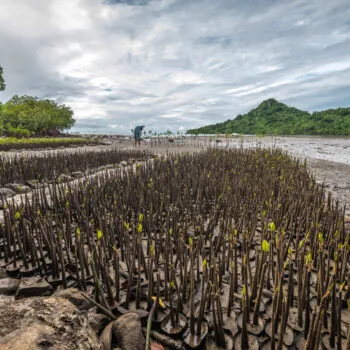The Asian Infrastructure Investment Bank (AIIB) is currently reviewing its Environment and Social Framework (ESF). This follows the commitment made in 2016 to review the ESF after a three-year period.
The review of the AIIB’s ESF in 2020 presents a perfect opportunity to re-assess how effectively the Bank is addressing the most urgent challenge of our time: climate change.
The AIIB has promised to be a ‘lean, green and clean’ development bank. Statements and policies of the AIIB and its shareholders are clear in their intent: the AIIB “will support projects that deliver local environmental improvements and investments dedicated to climate action”, according to the Bank’s 2020 Corporate Strategy. Furthermore, to be labelled as a ‘green’ bank, the AIIB must “holds itself to high international standards through its Environmental and Social Framework (ESF) which integrates environmental and social management methods into all its operations”.
However, this draft does not signal significant departure from the Bank’s current practice that would demonstrate compatibility with “a country’s transition toward sustainable, low-carbon energy and internationally agreed targets”. This means the AIIB must take further steps to expand the exclusion list to completely rule out both direct and indirect support of fossil fuels, whereby the safeguards in the ESF apply to both direct and indirect (financial intermediary) lending.
General comments
The Environmental and Social Framework (ESF) is the key tool the AIIB must implement environmental safeguards in its lending and operations. It should therefore ensure that this framework promotes the highest levels of ambition on climate mitigation and adaptation, biodiversity and nature-based solutions.
It should promote best in class energy efficiency standards, set out ambitious energy access Key Performance Indicators (KPIs) and be the vehicle for implementing best practices in terms of GHG accounting and carbon pricing. In this submission we focus on 2 main areas – how it should approach fossils and sustainable cooling – but we are keen to see ambition on all these points in the final document.
Coal
AIIB has repeatedly claimed in public to abstain from any finance in coal. During the 2017 Annual General Meeting, in front of the Bank’s Board of Governors, the President of the AIIB, Jin Liqun, stated that “there are no coal projects in our pipeline, and we will not consider any proposals if we are concerned about their environmental and reputational impact”.
In September 2020, the AIIB President said “Let me be very clear: I am not going to finance any coal-fired power plants… AIIB will not finance any projects that are functionally related to coal – for example roads leading to the plant or transmission lines serving coal power”. He continued to say that the 2020 Corporate Strategy would “set very tough conditions for the possibility of the bank to consider financing coal-firing power plants”. However, these aspirations did not materialise in the now published Corporate Strategy.
Nevertheless, an AIIB spokeswoman said the Bank was “committed to implementing the views expressed by President Jin”. She continued to say “AIIB has no coal-fired power generation in our pipeline and we do not think it makes sense to invest in coal or coal-related projects in our direct finance or capital markets portfolios”.
In strong contrast to these public statements, the AIIB has yet not officially ruled out finance to coal projects. The AIIB’s energy sector strategy, agreed in 2017, states that “carbon efficient oil and coal-fired power plants would be considered” for investments “if they replace existing less efficient capacity…or if no viable or affordable alternative exists in specific cases”.
Instead, the AIIB should engage with client countries to shift away from all coal-related investments.
In doing so, it would mirror similar action to what the European Bank for Reconstruction and Development’s (EBRD’s) has outlined in their Energy Sector Strategy, which rules out financing of thermal coal mining and coal-fired electricity generation. The AIIB could also learn from the Inter-American Development Bank’s ESF, which excludes “all steps involved in thermal coal mining or coal-fired power generation and associated facilities”.
Another example to follow is the European Investment Bank (EIB). In November 2019 the Board of the EIB agreed a new Energy Lending Policy. In it the EIB stated that “the Bank will phase out support to energy projects reliant on unabated fossil fuels”, with limited exceptions. This was a major milestone in MDB policies on fossil fuels and is an example of real transformational leadership from the EIB.
Importantly, the AIIB should mention that all clients will be required to publicly disclose their coal exposure.
This would replicate a key commitment of the International Finance Corporation’s (IFC) new approach to greening equity investments in financial institutions.
Fossil gas
The Energy Sector Strategy states that “the Bank will focus on supporting and accelerating its members’ respective transitions toward a low-carbon energy mix”, and that “in many countries, gas-fired power generation would form part of such a transition”. The Energy Sector Strategy also states that the AIIB “will also consider development, rehabilitation and upgrading of natural gas transportation (including storage) and distribution networks, and control of gas leakage, to foster greater use of gas during the transition to a less carbon-intensive energy mix/power sector”. Paragraph 37 of the Energy Sector Strategy does say “supported fossil fuel-based generation facilities would be expected to use commercially available least-carbon technology”.
However, energy access and other development benefits of gas are questionable in the first place. From a climate change standpoint, the latest science and technological realities contradict the perception that gas is a viable low-carbon solution.
Gas can actively hamper the transition to a climate-neutral energy system, by displacing or crowding out renewable energy deployment.
New renewables are cheaper than new fossil power generation (coal and gas) for most of the global population – an observation that the AIIB has also noted in their Corporate Strategy. From a development perspective, investment in fossil-based power generation assets with high operating costs may become stranded before end-of-life. Given a vastly oversupplied global gas market, sustained revenue from gas exploration thus hinges on globally expanding gas use, which is only possible if the world does not implement the Paris Agreement.
Beyond this, the construction and land disturbance required for gas drilling can alter land use and harm local ecosystems by causing erosion and fragmenting wildlife habitats and migration patterns. When gas operators clear a site to build a well pad, pipelines, and access roads, the construction process can cause erosion of dirt, minerals, and other harmful pollutants into nearby streams.
Against this backdrop, gas should not be a priority for the AIIB’s investment if client countries are going to be facilitated to transition to a zero-emission economy in line with the goals of the Paris Agreement. Coal-to-gas switching in most regions offers very limited, short term emissions benefits (if any at all).
Therefore, we propose exclusions should exclude the use of all fossil gas, especially as a ‘transition fuel’, and focus more on renewable energy sources or energy efficiency measures. This way, the Bank can truly “support its members’ respective transitions toward a low-carbon energy mix and finances investments that are demonstrably compatible with a country’s transition toward sustainable, low-carbon energy and internationally agreed targets”, as stated in the AIIB Corporate Strategy.
Oil investment
Despite acknowledging upstream investment in oil exploration involve “higher risk and must be subject to thorough assessment”, the AIIB allow “ample opportunities for investments in oil [and gas extraction] as [country] clients seek to improve the security of their energy supplies”. If the AIIB does not definitively end all upstream, midstream and downstream investments in oil, the AIIB misses an opportunity to strengthen its policies to operationalise the Bank’s operations in alignment with the Paris Agreement. The AIIB should follow the example of the European Investment Bank (EIB), which has defined Paris alignment as entailing an end to fossil fuel activities.
The current COVID-19 pandemic has showcased the vulnerability of the oil industry, which faces structural decline and the risk of stranded assets as well as stranded revenue to developing countries – many of which are either existing or prospective member countries.
Sustainable Cooling
The Environment and Social Exclusion List, 1.2.3 states: The Bank will not finance projects in the “production of, or trade in, ozone depleting substances subject to international phase out (Montreal Protocol)”.
The Bank should also include explicitly the Kigali Amendment to the Montreal Protocol in which the phase down of high global warming potential Fluorinated gases (F gases), could avoid 0.4oC of global warming.
Currently cooling technologies, for air condition and refrigeration are reliant on these F-gases which are up to 10,000 times more potent than carbon dioxide in causing global warming.
AIIB shareholders represent some of the key growth areas for cooling demand and of cooling access deprivation which has negative health and economic implications impacting agriculture, manufacturing, construction, labour productivity and the safe deployment of vaccines.
It is imperative that cooling be considered in climate risk appraisals and within the framework of the Bank’s Environmental and Social Framework with respect to keeping in line with climate and sustainable development goals (SDGs).
Download the full consultation response here.
Photo by Indi Samarajiva on Flickr.


